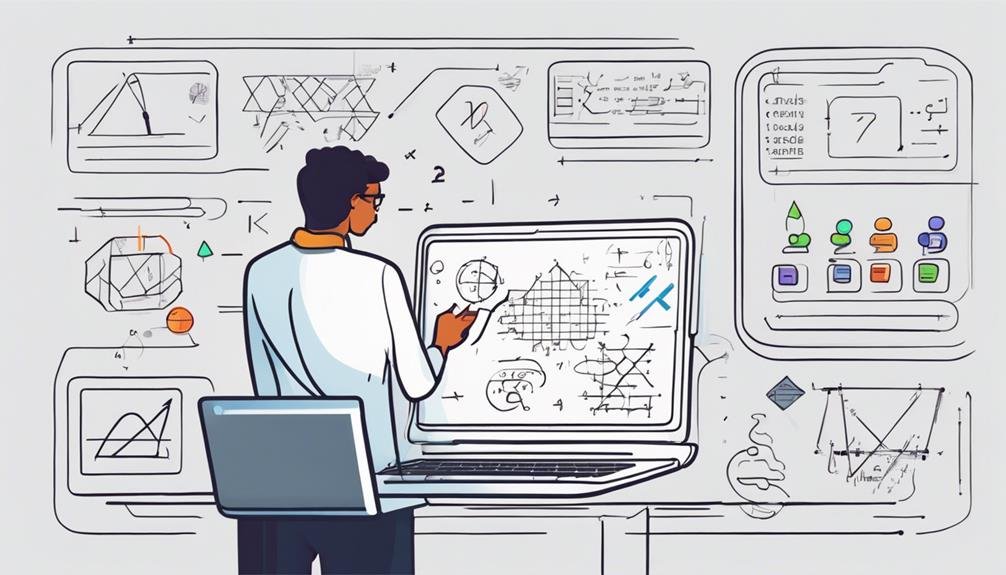To enhance your math skills effectively, focus on understanding math concepts deeply, engaging in game-based learning, applying math in daily life, practicing consistently, utilizing problem-solving strategies, setting achievable goals, and leveraging technology for learning. Understanding concepts boosts problem-solving abilities, while game-based learning enhances engagement. Applying math to daily situations improves practical skills, and consistent practice bolsters fluency. Problem-solving strategies enhance critical thinking, while goal-setting tracks progress. Utilize technology for interactive learning experiences. By combining these methods, you can improve your math proficiency noticeably.
Key Takeaways
- Engage in consistent practice to master math concepts effectively.
- Utilize game-based learning for a fun and interactive math experience.
- Apply math to real-life scenarios for practical understanding.
- Set achievable goals and seek support for personalized guidance.
- Embrace technology for math enhancement through interactive resources.
Understanding Math Concepts

Understanding math concepts is foundational to your ability to excel in mathematics. Conceptual understanding of mathematical concepts is essential for individuals looking to improve their math skills and problem-solving abilities. When learning math, grasping the underlying principles behind operations and functions not only helps in solving equations but also enhances overall proficiency in the subject. By understanding why and how math concepts work, you can approach problems with a deeper level of comprehension and confidence.
Conceptual understanding is like building a sturdy foundation for a house – it provides stability and support for further learning and application. Those who invest time in truly understanding the logic behind math concepts find that they can tackle complex problems more effectively. This deep understanding also leads to better retention of information and the ability to apply learned concepts to new situations. So, next time you encounter a challenging math problem, remember that honing your conceptual understanding is essential to mastering it with ease.
Game-Based Learning
When it comes to enhancing your math skills, game-based learning offers a valuable tool for improving problem-solving abilities, critical thinking, and overall mathematical proficiency. Interactive math games like Prodigy Math provide engaging platforms where you can practice and enhance your math skills in a fun and enjoyable way. By incorporating gamified elements, these educational activities not only make math more enjoyable but also help in retaining mathematical concepts effectively.
Interactive Math Games
Enhancing your math skills through interactive math games, particularly focusing on game-based learning, has been proven to boost student engagement and motivation. Interactive math games, such as Prodigy Math, offer personalized learning experiences tailored to individual student needs. By gamifying math concepts, these games enhance critical thinking and problem-solving skills, making learning fun and effective for students of all ages. Online math games provide immediate feedback, allowing students to strengthen their understanding of mathematical concepts in real-time.
Engaging with interactive math games not only makes the learning process more enjoyable but also encourages students to practice and apply math skills in a dynamic environment. The interactive nature of these games motivates students to actively participate in their learning journey, leading to increased retention and mastery of mathematical concepts. Through game-based learning, students can develop a deeper understanding of math while honing their critical thinking abilities in an engaging and interactive way.
Fun Learning Experiences
Through the lens of game-based learning, math education becomes a dynamic, engaging experience that fosters increased student involvement and understanding. Try game-based, interactive experiences to make learning math a fun and effective journey towards enhancing your understanding and boosting retention. Here are four reasons why incorporating fun learning experiences through educational games can benefit your math skills:
- Increased Engagement: Game-based learning in math has been proven to increase engagement and motivation among students, making the learning process more enjoyable.
- Reinforcement of Math Concepts: Educational games like Prodigy Math effectively reinforce math concepts through interactive experiences, helping you grasp and apply mathematical principles more effectively.
- Improved Problem-Solving Skills: Studies show that game-based learning can improve problem-solving skills and critical thinking in math, providing a practical approach to mastering mathematical challenges.
- Enhanced Understanding and Retention: Game-based learning offers a fun and effective way to practice math concepts, enhancing your understanding of challenging topics and ensuring better retention of learned material.
Engaging Educational Activities
Viewing math education through the perspective of game-based learning opens up a world of engaging and interactive opportunities that can greatly enhance your learning experience. Math games, such as Prodigy Math, provide fun ways to practice math skills while keeping you motivated and engaged. These educational activities not only offer a break from traditional learning methods but also help improve critical thinking and problem-solving abilities. By immersing yourself in interactive math games, you can cater to different learning styles and make the learning process enjoyable and effective.
Online platforms offer a wide variety of math games that cover various topics and difficulty levels, ensuring that you find activities that suit your preferences. Incorporating game-based learning into your math practice routine can lead to a more dynamic and stimulating learning experience. So, why not take advantage of these engaging educational activities to boost your math skills in a fun and interactive way?
Daily Life Application

Applying math skills in your daily life, such as when cooking, shopping, or budgeting, can greatly enhance your understanding of real-world math concepts. Calculating costs, change, and quantities during routine activities like grocery shopping or dining out provides practical examples of how math is used in everyday scenarios. By relating math to your daily experiences, you can make learning math more engaging and relevant, ultimately improving your grasp of mathematical concepts.
Real-life Math Scenarios
Enhancing your math skills through real-life scenarios is important for practical application and understanding. By immersing yourself in real-life math scenarios, you can truly grasp the relevance and usefulness of mathematical skills in everyday situations. Here are four ways real-life math scenarios benefit your learning:
- Enhanced Understanding: Applying math concepts in practical situations like budgeting or cooking helps you understand the relevance of what you learn in school.
- Improved Problem-Solving: Real-life math scenarios challenge you to calculate costs, quantities, and change during everyday outings, honing your problem-solving skills.
- Increased Interest: Connecting math to real-life scenarios fosters interest and motivation in learning, making the subject more engaging and relatable.
- Tangible Concepts: Relating math to everyday scenarios makes abstract concepts more tangible and easier to grasp, reinforcing the importance of mathematical skills in your daily life.
Practical Application Examples
To cement your understanding of math concepts, practical application in daily life is key. By incorporating math into real-life scenarios, you can enhance your skills in a tangible way. For instance, calculating grocery expenses allows you to practice addition and subtraction skills while managing your budget effectively. When measuring ingredients while cooking, you apply fractions and decimals in practical situations, honing your understanding of these concepts. Utilizing percentages to calculate discounts during shopping not only helps you save money but also deepens your comprehension of percentages. Additionally, budgeting your monthly expenses reinforces multiplication and division skills, aiding you in financial planning for the future. Finally, calculating travel distances and times helps you develop spatial reasoning and problem-solving skills that are valuable in everyday situations. By engaging with math in these practical ways, you can see its relevance and utility in your daily life.
Everyday Math Connections
By integrating math into your daily activities, you can establish a direct connection between theoretical concepts and practical applications. Understanding math through real-life applications in everyday situations is essential for enhancing your math learning experience. Here are four ways everyday math connections can benefit you:
- Enhanced Understanding: Applying math skills in daily tasks like cooking or budgeting helps you grasp real-life applications of mathematical concepts.
- Relevance Reinforcement: Calculating costs, change, or measurements during activities such as shopping reinforces the importance of math in your everyday life.
- Increased Motivation: Relating math to practical situations can boost your interest and motivation in learning mathematical concepts.
- Tangible Concepts: Real-life applications make abstract math concepts more tangible and easier to comprehend, facilitating a deeper understanding of mathematical skills.
Consistent Practice
Practicing math consistently is a fundamental aspect of honing your skills and achieving proficiency in problem-solving. Regular practice not only improves your math skills but also helps you identify and address areas of weakness. By engaging in repetitive practice, you reinforce your memory and enhance the accuracy of your mathematical calculations. Consistent practice is essential for developing fluency and confidence in math. It is through practice that you truly master mathematical concepts and solidify your understanding.
Problem-Solving Strategies

Consistency in practicing math not only sharpens your skills but also lays a strong foundation for effective problem-solving. When faced with challenging math problems, employing specific strategies can greatly enhance your problem-solving abilities. Here are some proven methods to tackle math problems with confidence:
- Practice Makes Perfect: Regularly engaging with math exercises hones your problem-solving skills and boosts your mathematical proficiency.
- Sketch Words: Transforming word problems into visual diagrams can simplify complex scenarios and help you approach them systematically.
- Visual Representations: Drawing charts, graphs, or geometric figures can provide a clearer understanding of the problem at hand and lead you to the correct solution.
- Engage with a Math Community: Collaborating with peers, discussing strategies, and seeking help from tutors can introduce fresh perspectives and innovative approaches to problem-solving challenges.
Goal Setting and Support
Setting achievable goals and seeking support are essential components of developing strong math skills. To excel in mathematics, start by setting attainable objectives that can help you track your progress and maintain motivation. Identify the areas where you struggle the most and don't hesitate to seek assistance from tutors or peers. Breaking down your goals into smaller, manageable tasks can prevent study sessions from becoming overwhelming. Engaging with math tutors for personalized guidance can provide valuable insights and enhance your understanding of complex concepts. Remember to focus on mastering one math concept at a time. By building a solid foundation through thorough understanding of each concept, you pave the way for successful learning in more advanced topics. Embrace the journey of learning math by setting clear goals, seeking support when needed, and dedicating time to mastering fundamental concepts.
Technology for Math Enhancement

To enhance your math skills effectively, embracing technological tools can provide a significant advantage. Technology offers a plethora of resources and opportunities to engage with math in exciting and interactive ways. Here are four ways technology can enhance your math skills:
- Online Resources: Utilize online platforms that offer interactive tools and exercises for convenient and personalized learning experiences.
- Math Tutor Apps: Take advantage of educational apps that provide tailored math practice opportunities to address individual needs and enhance understanding.
- Engaging Experiences: Explore platforms like Prodigy Math that facilitate interactive and engaging math learning experiences, making the process enjoyable and effective.
- Educational Apps: Incorporate diverse math practice activities into your routine by using educational apps that offer a wide range of interactive tools to improve your skills efficiently.